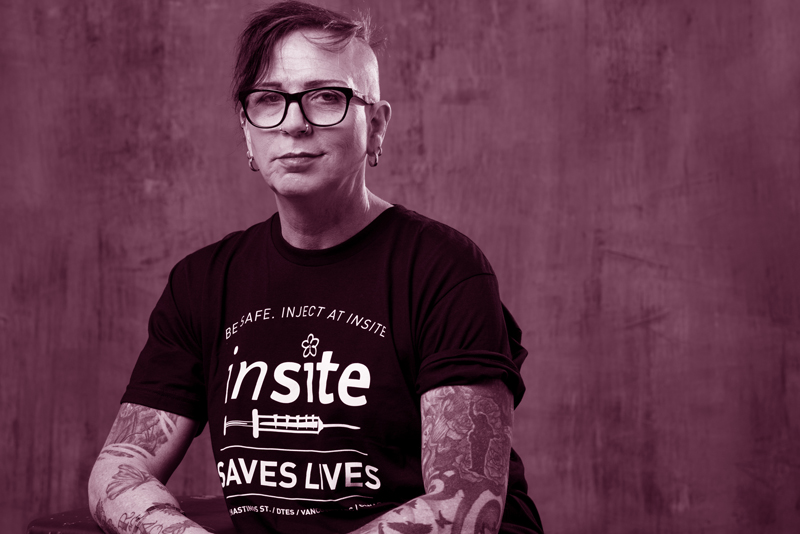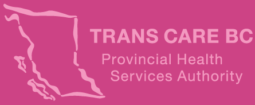
Trans people in British Columbia have:
- The right to advertise our own sexual services online or anywhere else. However, web pages and print magazines that carry our ads may face charges.
- The right for our partners and anyone else in a ‘legitimate living arrangement’ to benefit financially from our sexual services, provided the relationships are not exploitive. However, you should be aware that the term ‘legitimate living arrangement’ has not yet been defined in law. Also, most work relationships between sex workers and others who benefit from their work are currently criminalized.
- When seeking support, the right to access gendered spaces that correspond with our felt gender identity, regardless of our anatomy.
- Unfortunately, the right to receive gendered services and participate in gender-based activities has one exception. A transphobic court case decided that if the organization offering the service is a non-profit organization whose primary purpose is to serve women, it is allowed to discriminate against trans women. That said, many women’s organizations welcome and include trans women.
- The right not to be harassed, targeted, arrested, or intimidated by police for doing sex work.
- The right to privacy in our home from the police. Generally, we do not need to answer the door if the police come to our home. There are exceptions. You must answer the door when police come to your home if:
- They have a warrant (check that the address and date on the warrant are correct).
- We have conditions in a bail or probation order.
- They are chasing someone who has run into the building.
- They are trying to help someone who is in immediate danger.
- They believe evidence of a crime is being destroyed.
- The right to keep our identity private from the police. Officers do not have the right to know our identity unless they have reasonable suspicion that we have committed a crime.
- In this case, they are entitled to our name, address, and birthdate. There is no general requirement to carry identification papers with us, so we don’t have to show them identification unless you are driving a car.
- Protection from search and seizure. This means unless we are detained or arrested, we do not have to let police search our body or possessions (including our car). An exception to this rule exists when crossing the border into Canada.
- The right to be referred to by the name and pronouns that we use.
- The right to have our concerns taken seriously when we report a crime.
- The right to turn to the police for help. The priority of the police is to ensure the safety and security of everyone, including sex workers.
- The right to have all reports of violence against us treated as serious criminal matters by the police.
If you are a sex worker, it is illegal to:
- Communicate for the sale of sexual services in a public place, or any place that is open to public view, that is or is next to school grounds, playgrounds, or daycare centres.
- The communicating law puts those of us who work outside at the greatest risk of arrest.
- Stop or attempt to stop a vehicle, impede pedestrian or car traffic, or impede an entrance/exit to a venue for purposes of sex work.
- Advertise collectively.
- Those who put out or publish our sex work advertisements are also at risk of arrest.
- Hire or work with third parties, or work together with others doing sex work.
- This reduces our abilities to employ collaborative practices that make our work safer.
For trans people in working in indoor sex work:
- Many agencies in Vancouver do not hire trans sex workers. This is unfair, but, with the current criminalized environment around sex work, it is difficult to challenge legally. If an agency operates as a licensed business (for example, as a massage parlour), you could bring a challenge to their hiring practices under the BC Human Rights Code. However, you would need to think carefully about whether this would bring the desired result. The process is adversarial, and it is often long and stressful. If you are successful, instead of getting a position with the agency, you may only be awarded damages, since it is likely that your relationship with your potential employer would be too irreparably damaged for you to realistically work together. Additionally, bringing legal attention to businesses offering sexual services may result in the business coming under additional unwelcome legal pressure.
- Working independently has considerable benefits. You keep all your money. You screen your own calls. You hire people (if you choose) that you trust to help keep you safe. As noted above, these business relationships are against the law, so if you choose to work with others, you will have to be discreet in order to keep yourself and your colleagues safe.
- If you are working independently, it is a good idea to have a separate phone for business, or to make your number private. Because purchasing sex is a crime, many clients will not feel comfortable giving you their full name. This makes screening more difficult.
- When booking an appointment, listen to your gut. If the person on the phone is disrespectful or makes you feel uncomfortable, do not see them. If you are going to them, leave their address with someone you trust. Have someone you can call when you reach the client’s location. Call or text them in front of the client. They will be reluctant to mistreat you if they know you have someone waiting for you.
- It is generally safer to let your clients come to your location, if you have a space that is private. Because of the criminal prohibition on the purchase of sexual services, it is always best to be very discreet.
- The Vancouver Police Department has issued guidelines saying that enforcement in cases of adult consensual sex work is not a priority for them, provided there is no violence or exploitation. Police in other municipalities do not have the same guidelines and may work together with municipal bylaws enforcement officers and Canadian Border Services Agency personnel to enter businesses. These agencies primarily target commercial establishments such as massage parlours and situations in which a number of sex workers are working together such as condos.
- Your landlord cannot evict you unless engaging in sex work would contravene a specific term in your lease agreement; for example, a clause that prevents you from running a business from the premises. If that is the case, your landlord must have evidence to prove that you are contravening your lease. If your clients are discreet and respectful, you most likely will never have a problem.
- It may be easier to work out of a high-rise apartment with a lot of residents because these places tend to be more anonymous.
- In order to minimize noise and the chance that your conversation will be overheard, it is a good idea to keep chit-chat to a minimum in the hallways. When greeting clients at the door, don’t say hello until the door closes.
For trans people in working in outdoor sex work:
- Outdoor work is generally considered riskier than indoor work. For one, you are more visible to the public and law enforcement. You may be also displaced into dangerous and isolated parts of the city in order to avoid police detection.
- Remember that selling sexual services is not illegal. However, the laws criminalize the purchase of sexual services and all communications by clients about sexual services. This means that clients may be more afraid of law enforcement and more reticent to approach and negotiate with you in well lit, high visibility areas. This makes screening more difficult while working outdoors.
- Remember to keep safe by working with a friend if possible. This way, you can take license plate numbers for one another and share experiences.
- If you can, carry a cell phone. Even an out-of-service cell phone gives the impression of being in contact with someone else. You can use this to your advantage.
- Collect the money upfront. Keep your money in a less obvious place in case someone tries to rob you.
- Wear shoes you can run in just in case you need to. Be prepared to defend yourself.
- If something feels wrong, don’t go with a potential client. No trick is worth compromising your safety.
- Some clients will be ok with using condoms. Others will give you attitude or try to obtain unsafe services. One strategy is to have the condom in an easily accessible place and put it on using your mouth. Clients are less likely to complain about wearing a condom if they are distracted by oral sex.
- Law enforcement sometimes uses condoms as evidence of sex work. This is a violation of your legal rights. You have the right to protect yourself from STIs.
- You can access Bad Date Reports at PACE and WISH, both of which run drop-in centres, as well as at other drop-in centres around the greater metropolitan Vancouver area. These reports are an excellent resource for keeping safe.
Staying Safe from Police Brutality
- Trans people report high rates of harassment and violence from police. This is especially true for trans women who are also Aboriginal, people of colour, and sex workers. It is good to stand up for your rights. It is sometimes more important to be safe. To help keep yourself safe:
- Try to be calm during encounters with police and do everything you can to keep yourself and others safe without becoming a target.
- Speak quietly if you speak at all, keep your hands visible, and move slowly. If you are going to put your hand in a pocket or purse to get something out, tell officers what you are doing before you do it.
- If your life is in danger, it may be better to strategically submit to an attack by police in order to preserve your life.
- If possible, pay attention to the badge numbers of police officers you deal with and keep notes about things that happen to you. You may need this information later to file a complaint or to tell your lawyer.
- If police mistreat you, you have many options:
- You can file a human rights complaint if there is evidence that the mistreatment was motivated by your trans status.
- If the complaint is against the municipal police, file your complaint with the BC Human Rights Tribunal. See Filing a Human Rights Complaint for more information. If your complaint is with the RCMP, file with the Canadian Human Rights Commission .
- You can sue the police if there is no evidence that the mistreatment was motivated by your trans status. See www.transrightsbc.ca for more information.
- You can file a complaint with the Office of Police Complaints. For help filing a complaint against the police, call the BC Civil Liberties Association at 604-687-2919, or toll-free at 866-731-7507.
- You can report the crime to police, who may press charges.
How can you stand up for your rights?
- Advocate for signage that indicates that spaces where you access support welcome trans people.
- Advocate for training for service providers about how to be respectful of trans people.
- If you are denied services or access to a gendered space (including a washroom or change room) that corresponds with your felt gender identity, you can file a human rights complaint under the BC Human Rights Code. See the Filing a Human Rights Complaint section of our website for more information. In cases where you are being discriminated against by an organization that claims it is covered by the one exception in the BC Human Rights Code, contact a lawyer.
- If you are denied services on the basis that you are trans, you can file a human rights complaint under the BC Human Rights Code. See the Filing a Human Rights Complaint section of our website for more information.
- If you experience harassment or violence, you can report the crime to the police. Is some cases, you can sue or file a human rights complaint. See our Harassment and Violence resources for more information.
Who can i go to for help
- If you are in crisis, you can contact:
- PACE Society at 604-872-7651 provides counselling, advocacy, peer education, support, and individual case planning and coordination. Located in Vancouver.
- WISH Drop-In Centre Society to report a bad date by calling 604-669-9474, emailing wishdropincentre@telus.net, or faxing 604-669-9479. This service provides current updates on violence or predatory dates by and for sex workers. Bad date reports are taken by the WISH Drop-In Centre Society and are disseminated through a large network of service providers in contact with women working in the sex industry.
- Women Against Violence Against Women (WAVAW) 24-hour toll-free crisis line at 604-255-6344 or 1-877-392-7583. They provide confidential, immediate emotional support, information, and referrals to people of all genders. They can also provide hospital accompaniment, counselling, and victim services for all women. Located in Vancouver.
- If you are in need of support, you can contact the following organizations:
- PACE Society at 604-872-7651 provides counselling, advocacy, peer education, support, and individual case planning and coordination. Located in Vancouver.
- Taking Care of Business at 604-734-1514 is a weekly drop-in for trans sex workers. Food, information, and support are provided in a safe and confidential space. Located in Vancouver.
- Boys R Us Drop-In at 604-633-4220 is a referral and outreach program that provides a safe, supportive drop-in for guys and trans folks who work or used to work in the sex trade. Located in Vancouver.
- HUSTLE at 604-488-1001 ext 231 or 778-868-1776 (Outreach) supports male and trans sex workers as well as experiential youth by offering outreach and support programming in the community. Located in Vancouver.
- WISH Drop-In Centre Society at 604-669-9474 provides services to women in survival sex work. Their drop-in centre is a safe place off the street where women can find acceptance, hot meals, support services, and more. Drug and alcohol free space. Located in Vancouver.
- MAP (Mobile Access Project) at 604-720-5686 provides outreach, counselling, condoms and clean needles, basic first aid, immediate response to emergency services to sex workers, as well as bad date reporting. The MAP Van makes a nightly circuit through various sex work strolls. Operates in conjunction with WISH Drop-In Centre Society and PACE Society. Located in Vancouver.
- SWAN (Sex Workers Advocacy Network) at 604-719-6343 is a culturally diverse group of women working to provide culturally appropriate and language-specific support, education, research, advocacy, and outreach for migrant, and immigrant sex workers. Located in Vancouver.
- Health Initiative for Men at checkhimout.ca is a community organization dedicated to strengthening the health and wellbeing of gay men. Located in Vancouver.
- Constable Linda Malcolm is the Sex Work Liaison Officer at the Vancouver Police Department specifically designated to assist when sex workers encounter violence and may be contacted atmalcolm@vpd.ca or via WISH or PACE.
- New Hope Society at 250-562-8680 or email jan_newhope@hotmail.comis a sex worker outreach service. Located in Prince George.
We recommend:
- The Bute Street Clinic for trans- and sex worker-friendly health care. They are an STI clinic and provide PAP testing, free condoms, and dental dams (when in stock) at 1170 Bute Street in the QMUNITY building in Vancouver. Hours of operation are 11am-6:30pm Mondays-Fridays.
- AIDS Vancouver for condoms, dental dams, and fresh needles. They are located at 803 East Hastings Street in Vancouver.
- The SPACES Study which is a collection of trade secrets from people of all genders.



